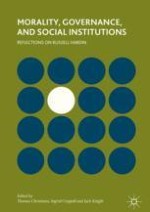2018 | OriginalPaper | Chapter
“Führer befiehl, wir folgen dir!” Charismatic Leaders in Extremist Groups
Authors : Michael Baurmann, Gregor Betz, Rainer Cramm
Published in: Morality, Governance, and Social Institutions
Publisher: Springer International Publishing
Activate our intelligent search to find suitable subject content or patents.
Select sections of text to find matching patents with Artificial Intelligence. powered by
Select sections of text to find additional relevant content using AI-assisted search. powered by
